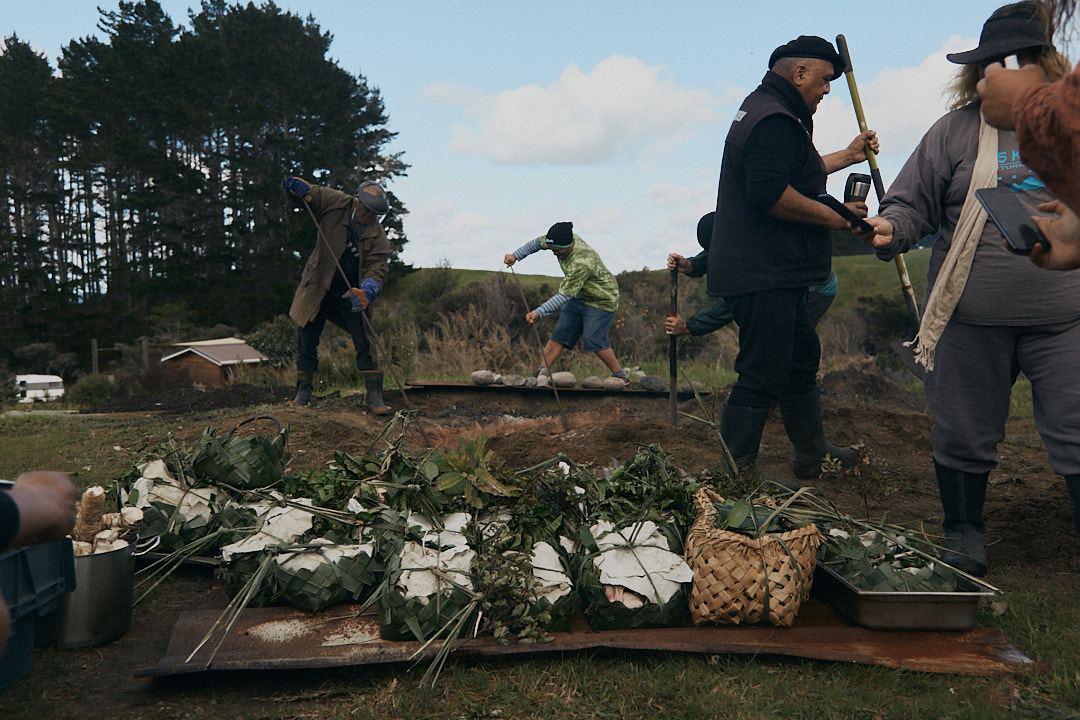
27 Jun Into a whakapapa of thought
It has been close to two years since I started this role as kaiarahi mō te kaupapa Kai Māori with Toi Tangata. It has been such a beautiful learning journey and I’ve had a lot of help along the way as I make sense of kai as a kaupapa that is deeply Māori and interconnected with many layers of our whakapapa. I’ve had to learn about how kai makes us well and how settler colonialism impacts on the extensive role of kai within our lives as whānau. To celebrate and mark those two years, I’m going to share some of the really important sources I have found over that time, whether they are podcasts, books, Instagram profiles or mātanga who are dedicated leaders in their field. Of course, this is only an opening and certainly not comprehensive, but nevertheless, I am so thankful for their guidance and hope you also enjoy what they have to share.
Whanaungatanga ki te taiao
These resources have helped me to make sense of the interrelated nature of kai and taiao. In present-day food movements in New Zealand, native ecosystems are systemically overlooked in terms of their role in upholding and enabling (non-native) food cultivation. When it comes to understanding kai as a concept that is deeply Māori we must start with understanding and uplifting our tuākana, our taiao, as central not only to sustainable food futures in Aotearoa but to sustainable climates the world over. Further to this, these resources name the ways in which Indigenous food systems have been disrupted and damaged through settler colonialism, imperialism, and globalisation. Knowing and understanding these structures of power and how they shape our lives today can provide clarity and help us to further define what mahi needs to be done.
- Amitav Ghosh, The Nutmegs Curse (Book)
- Māori Marsden, The Woven Universe (Book)
- For the wild; Cultivating Place; Agam The Climate Podcast (Podcasts)
- People to follow: Rereata Makiha, Vandana Shiva, Dallas King
- Hana Burgess & Te Kahuratai Painting: Onamata Anamata, a whakapapa perspective of Māori futurisms (Book chapter from ‘Whose futures?’)
Whanaungatanga ki te kai
The cultivation of kai itself is often a very obvious starting point for people interested in food. I’ve read many gardening books in the last 5-6 years, but these are the ones I would recommend first and foremost. They provide both practical instructions for the growing of kai, while naming and highlighting power structures that we will undoubtedly meet along our journeys. Without a critical lens these systems of power will simply reproduce themselves over and over again in ways that appear more inclusive and representative. Getting to the root of how food growing intersects with things like Indigenous land theft, oil-dependent globalised food systems and slavery are important considerations for all those involved in food cultivation in Aotearoa
- Leah Penniman, Farming While Black
- Jessica Hutchings, Te Mahi Māra Hua Parakore, Te Mahi Oneone Hua Parakore
- A Growing Culture, website, Instagram
- Joe Mcleod, website
Whanaungatanga ki te tāngata
While these resources may not seem on the surface to be deeply tied to kai, our kai practices, and our well being, what I hope these resources outline for people is the importance of community. As Māori, we already deeply know the importance of kai to our collective contexts and vice versa. I hope these resources will help guide us into a place of solidarity with our neighbors, our whānau; those with whom our futures are deeply intertwined. These resources have been an awesome starting point from which to use our imaginations when it comes to building community through kai.
- Bell Hooks, All about love
- Adrienne Maree Brown, Murmurations a collection of online essays; Emergent strategy (Book)
- Saraid De Silva & Julie Zhu Conversations with my immigrant parents (Podcast)
Whanaungatanga ki a koe anō
I have struggled to really find a lot of resources that I really love in the context of building whanaungatanga with the self through kai. The ways that food intersect with our relationship to the self are largely dominated by nutrition and dietetics, which are limiting, and even harmful. Some of the resources below debunk a lot of the myths and false promises around nutrition and dieting more generally, while others explore the self in expansive ways that can bring us backclarity, and may even provide a basis for further developing our personal relationships with kai.
- Ilya Parker @Decolonizing_fitness, Shana Minei @thenutritiontea (Instagram)
- Aubrey Gordon & Michael Hobbs Maintenance Phase Podcast (Podcast)
- Alok Menon, For the Wild Podcast, Instagram

Haylee Koroi
Haylee (Te Rarawa, Ngāpuhi, Ngati Kahu) is Kaiārahi for Kai Māori Kai Ora at Toi Tangata.



